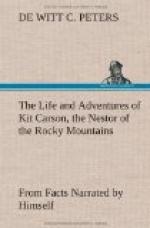It was during Carson’s stay of four days in Taos, that Armijo and his small army had started out in quest of the enemy; but, before his departure, he had received the letter and directed an answer to be sent, thinking perhaps, that Kit Carson might reach the train even if he himself did not. On the answer coming into Carson’s hands, he selected a Mexican boy to accompany him and was quickly on the road again. They had left Taos two days’ journey behind them and had reached the River Trinchera (for they were traveling via the Sangero de Christo Pass and Bent’s Fort) when they unexpectedly met four Indian warriors. Eat Carson immediately recognized them as hostile Utahs. As yet the red men were some distance off; and, while Kit and his companion stood meditating what was best to be done, the latter spoke and said to the former: “I am a boy and perhaps the Indians will spare my life. At any rate yours is much more valuable than mine, therefore mount the horse you are leading, without delay, and make your escape.” Carson at first thought this advice to be good, and was about acting on it, when it struck his equally generous heart, how cowardly such a course would be—to desert a youth who had in the hour of peril so manfully borne himself. Turning to the boy he thanked him and added that “he could not and would not desert him.” He said “we must stand our ground together and if we have to die let us take with us each his warrior.” While this colloquy was going on, the foremost of the Indians came up. He approached Carson with the air of a man sure of an easy victory, and, with a bland smile, proffered one hand in friendship, while, with the other, he grasped Kit’s rifle. A powerful blow from the fist of the latter released his hold and instantly laid him sprawling upon the ground. The other Indians, seeing the fate of their companion, hastened to his rescue. When they reached talking distance,




